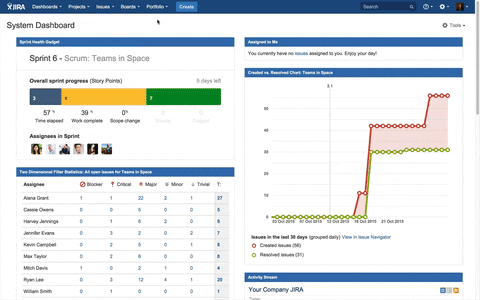Scouring the project management landscape for the best Jira alternatives? You're in luck. Here, we cut through the noise and zero in on top contenders that could give your team's productivity a serious boost.
Jira holds a market share of 36.81% in the project management software industry, but it's not your only option. In fact, 75% of businesses report needing project management tools with more customizable features than what Jira offers. Finding the right project management tool could be a game-changer for your business.
From ClickUp's charm with its user-friendly interface to monday.com’s high-five-worthy user experience—this roundup has got you covered. We'll even dive into agile-focused options like Redmine, perfect for those who live and breathe software development sprints.
What is Jira?
Jira, developed by Atlassian, is a well-known project management tool used extensively by teams across the globe. Its primary function revolves around issue tracking and agile project management. Whether you are part of a software development team or working in customer support, Jira provides an efficient way to organize tasks, track progress and manage workflow.
One of the key features of Jira includes creating user stories and issues, planning sprints and distributing tasks across your team. It also offers customizable workflows that allow teams to manage their work based on their specific needs. Looking for open source alternatives to Jira requires you to know your must-have features.
JIRA's Features
User-friendly interface: The platform has an intuitive interface which makes it easy for users to navigate through different functionalities.
Versatile task management: With its powerful search feature, filtering tasks becomes straightforward enabling managers to assign priorities effectively.
Detailed reporting: JIRA comes with robust reporting tools that help monitor individual performance as well as overall project progress.
Fully customizable: The tool allows full customization according to business requirements making it adaptable for various industries.
In spite of these impressive features however, some businesses find themselves searching for alternatives due either cost considerations or needing functionality not covered by JIRA.
Decoding the Need for Jira Alternatives
Jira has long been a staple in project management, especially for software development teams. But as diverse projects and unique team dynamics emerge, businesses are scanning the horizon for Jira alternatives that better align with their specific needs. A variety of factors such as usability, cost considerations, and tailored features come into play when searching for an optimal project management tool.
For small teams or startups sensitive to pricing options, looking beyond Jira's paid plans is essential. The market offers robust project management platforms with free plans or affordable basic plans that might be more suited to tight budgets without skimping on key features like task management and time tracking.
User interface plays a crucial role too; if your team finds themselves grappling with a steep learning curve associated with advanced tools like Jira, it may dampen productivity rather than boost it.
Agile teams often seek out solutions that support quick pivots through agile project planning while offering real-time collaboration features—a realm where some find alternative tools provide greater agility or simplicity compared to what they experience with Jira.
The right tool should not only track issues efficiently but also seamlessly integrate with other commonly used applications—like Google Calendar or Google Sheets—making sure everything stays in sync. Software solutions need to give you enough customization options so you can create workflows unique to your processes while also maintaining ease of use.
When seeking another project management tool, keep the following in mind:
How many projects your team manages at once
How many people you'd need seats for on the tool
Ease of use
Cost
Functions/regular updates
Quality of customer support
Ability to expand
My experience working in various project management apps with a range of teams has shown me how different their priorities can be. Some teams are focused on keeping the workflow organized and on track while others are looking for a contained and logical way to communicate about work in development. Still others need a scheduling or budgeting element in their workflows.
You'll also want to identify your constraints: parameters you have to work within. For example, one company may have a specific budget for the app, another may need the app to work for a team of a certain size, and another may need an app that integrates with certain software.
-Katherine Gustafson, Business Writer
The 6 Best Jira Alternatives
When you're knee-deep in project management, finding a tool that meshes with your team's workflow is key. That's why many are on the lookout for solid Jira alternatives to boost productivity and streamline processes.
Project management tools vary in their applications, which is why you need to know what your team needs when seeking out a Jira alternative.
Tools can be:
Individual: These types of project management tools are designed to track tasks for a single person. As a result, they might lack business-specific features—or they might come at a lower overall price to be more accessible to individual consumers.
Collaborative: Project management tools that are collaborative are robust enough for both large and small teams. They often focus on features like in-app communication, dependencies and delegation-related features.
Integrative: This project management option embraces the collaboration and coordination of all project parts. These tools are typically data-driven—offering advanced insights for both stakeholder and team member reference, as well as resource allocation tools.
-Christine Levandowski, Newsweek Contributor
1. ClickUp

The quest for an intuitive user interface leads us straight to ClickUp. Its clean layout lets teams start without stumbling over a steep learning curve—ideal for small teams eager to jump right into task management.
But it isn't just about getting started easily; ClickUp’s competitive pricing options make sure even startups can plan like pros with features such as kanban boards, Gantt charts, and time tracking—all without breaking the bank.
In a G2 review, user Mohamed says:
Click Up has a diverse set of project management and collaboration tools. One key feature that is useful to my design team and I are the custom dashboards. I can set up custom filter instances and track projects for the whole team, or filter down by individual, and look at a pie chart of request, in progress, and in-review items all in one view.
2. monday.com

Monday.com shines bright when we talk usability—it’s truly a powerhouse. With its vivid user interface coupled with agile project management capabilities, this platform ensures team collaboration feels less like work and more like second nature. You can dive into their ecosystem here: monday.com.
Juggling tasks across platforms? Zoho Sprints makes integration seamless—from Google Sheets to calendars—and keeps everyone on track by merging bug tracking with robust project planning tools suitable for development teams of all sizes.
In her G2 review, user Claudia D. Says:
I love how I can keep my projects and work progress up to date, using Monday.com really does help me plan whats in system and whats been approved. I enjoy the fact that I can edit tabs and lables to cusomise my boards. I mainly use this as a ststus tracker that we use in the agency. But I have friends that use Monday.com to also send in tasks.
3. Asana
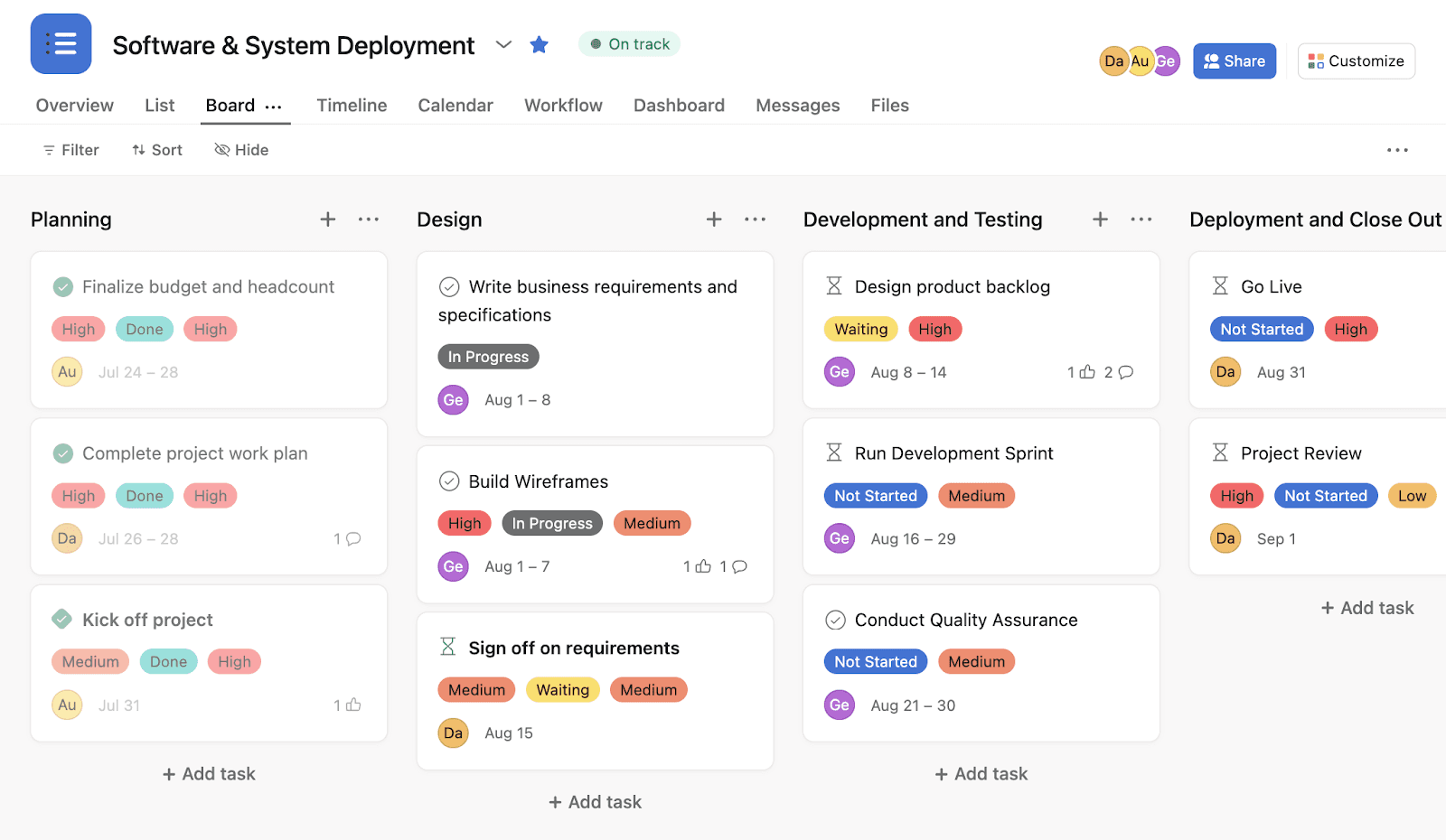
When teams start looking beyond Jira for a project management tool that emphasizes integration and collaboration features, Asana emerges as a robust choice. Known for its ability to create workflows that support multiple aspects of business operations, Asana boasts advanced reporting capabilities which make it easy for team members to track progress on tasks and projects.
With an intuitive user interface and the capacity to integrate with software solutions like Google Calendar and social media platforms, it's no wonder why small businesses find Asana appealing.
The agility offered by this platform isn't just beneficial for specific teams; even agile teams find its approach conducive to dynamic project planning. What stands out is how seamless it integrates with other tools—a key feature in today's interconnected work environment where data reports from various sources need to come together coherently.
In a G2 review, user Patrice D. notes:
I love that I can have my procedures located in one central place that I can assign team members to. As their roles change, I remove or add them easily. As the job changes, I can easily make edits to the work process and this notifies the team members as well. These saves me from having to create new training as it already exists. I particularly enjoy being able to add detail to a task, but it is located in a sub folder so it doesn't clutter up the screen until it is clicked on. I like that I can upload pictures as well.
4. Trello
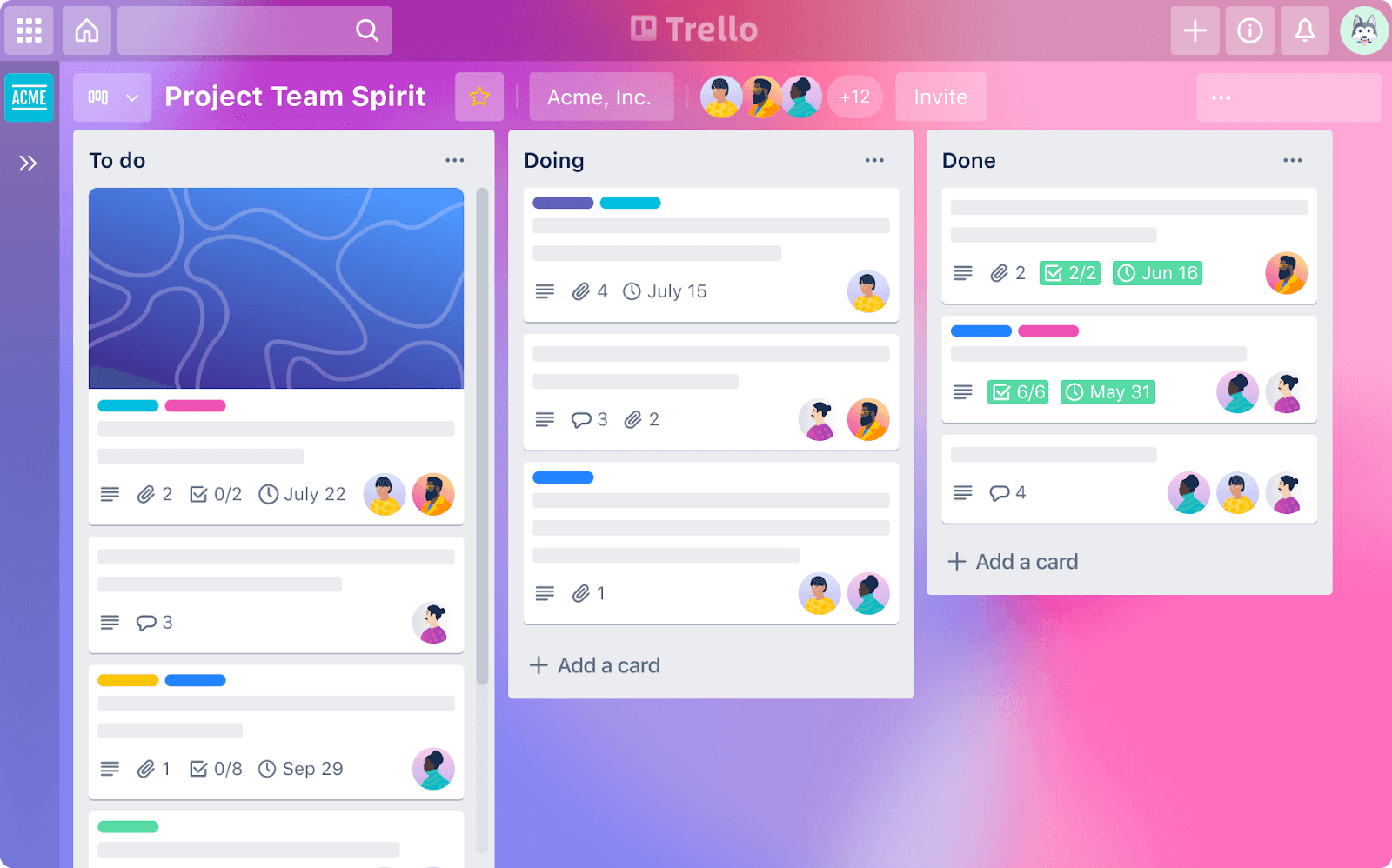
If your day-to-day involves visual task management using Kanban boards, Trello might be right up your alley. It’s particularly useful when simplicity is paramount—whether you're part of a small development team or need something less intimidating than traditional Gantt charts.
The free plan suffices many users' needs while paid plans offer more bells and whistles without overwhelming the learning curve.
Team collaboration takes center stage here because every single task can be visually managed through Trello’s cards system—ideal when quick overviews are necessary but details can’t be missed either.
In a G2 review, user Luis A. Shares:
Trello is an excellent tool for teamwork, it allows you to keep track of the tasks and activities that each staff is carrying out. raise supports, generalize roles, and have better organization within the work area. The collaboration of the projects is all done in real time, allowing us to be up to date when making some changes. It has a mobile application, which today is an option that should not be missing in any system.
5. Smartsheet
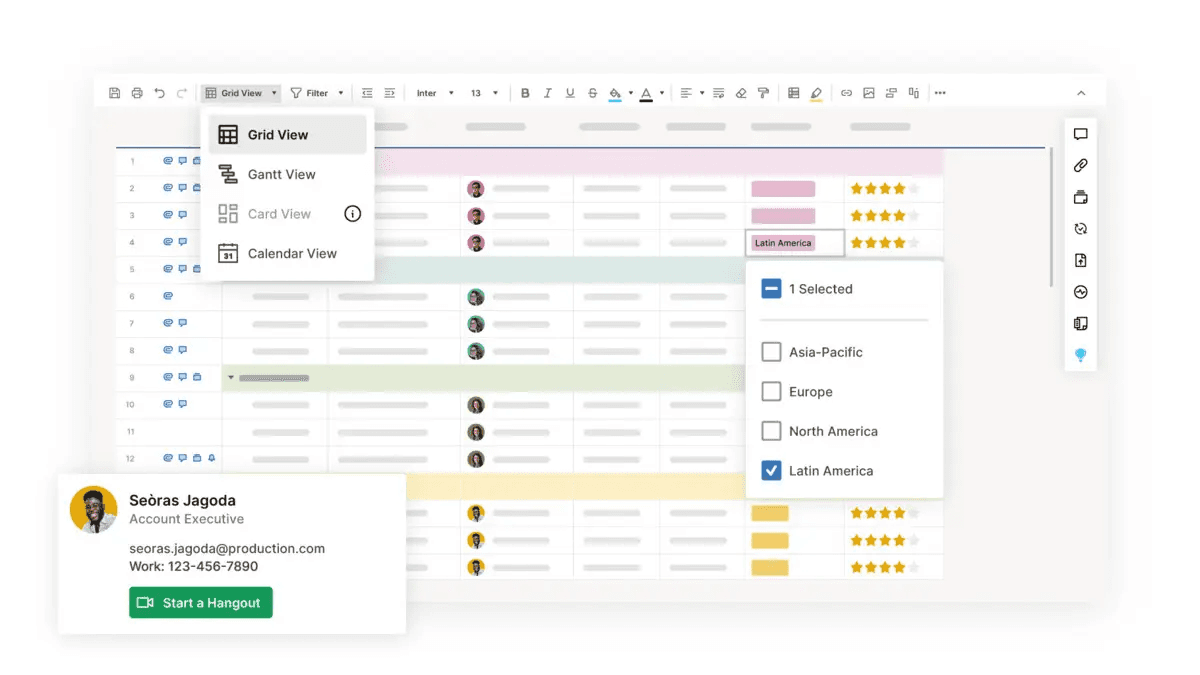
If Smartsheet had a motto, it could well be 'the power of spreadsheets amplified'. Many professionals already familiar with Google Sheets will appreciate Smartsheet's similar look-and-feel along with added functionality suited specifically for project management purposes such as time tracking or resource allocation embedded within the sheets themselves.
This particular project management tool alternative doesn't shy away from offering customization options galore—the flexibility allows organizations not only to manage their current workload but also aids in strategic long-term project planning scenarios too.
In a G2 review, user Constance F. says:
Smartsheet is a fantastic solution due to the automation capabilities, numerous features, intuitive training and capabilities of connecting with multiple technologies and platforms. In particular, it is helpful to have the ability to link numerous sheets, dashboards, etc. together, thereby making it easy to upload a single document and have updates made automatically in all linked documents. The continuous feature requests and amazing Smartsheet team's customer service also makes this an intuitive and pleasant experience in creating elegant and easily understandable solutions for gobal audiences.
6. Wrike
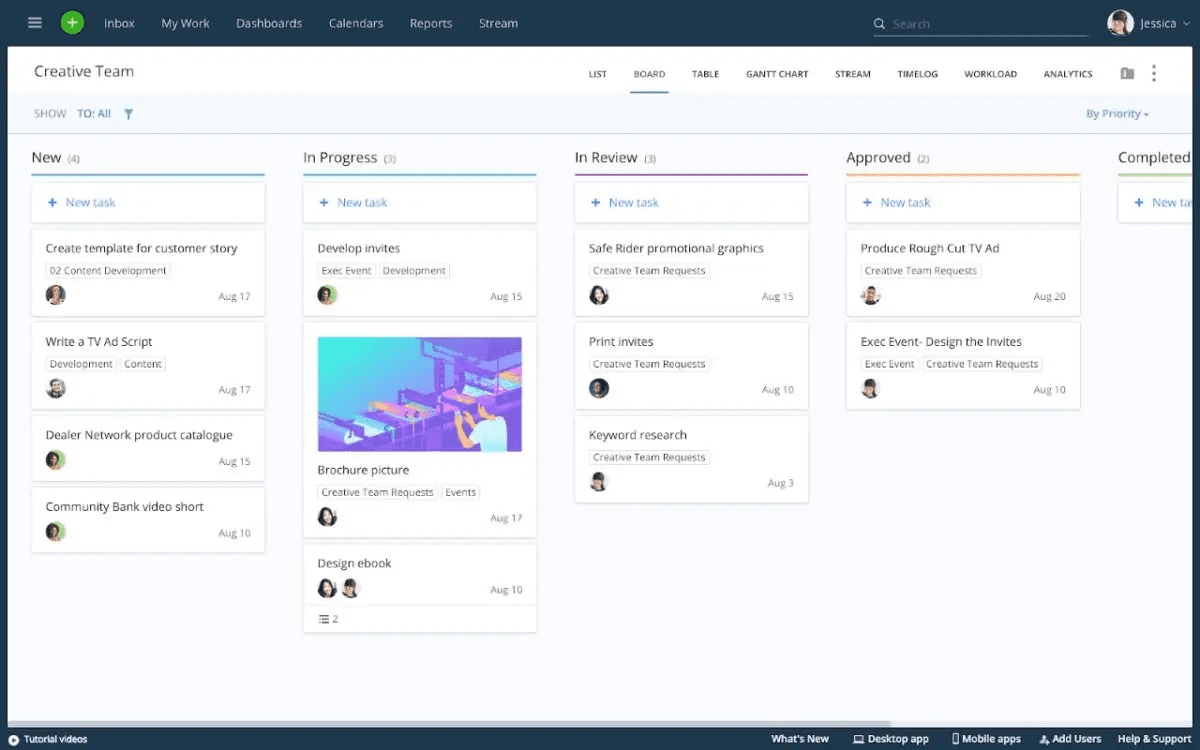
Wrike caters to marketing departments and professional service firms, offering a simplified workflow management solution. It provides powerful features for larger development teams and those practicing agile project management methods, without compromising on simplicity.
From basic plan offerings suitable for smaller outfits all the way through enterprise-grade solutions complete with dedicated customer support channels—it seems there truly is something here regardless of company size or industry niche.
In a G2 review, user Lisa says:
What I appreciate most about Wrike is its user-friendly interface and intuitive design, which make it incredibly easy to learn and use the tool effectively. From the moment I started exploring Wrike, I found the platform's layout to be clear and organized, allowing me to navigate seamlessly through its various features. The straightforward workflow and well-defined functionalities meant that I could quickly grasp how to create tasks, set deadlines, assign responsibilities, and track progress without any steep learning curve. Moreover, Wrike provides ample support resources such as tutorials, documentation, and webinars, which further facilitate the learning process for both new and experienced users. Overall, the ease of learning and mastering Wrike has not only expedited our team's adoption of the platform but also significantly boosted our productivity and collaboration, making it an invaluable asset in our project management toolkit.
7. Redmine
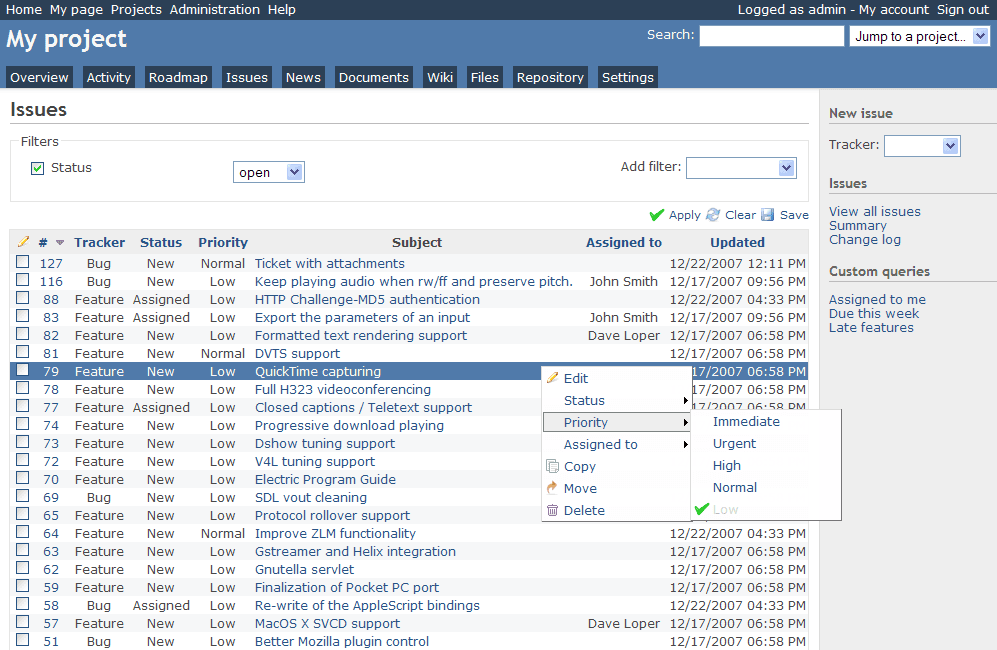
For developers who crave open-source flexibility paired with robust issue tracking capabilities, Redmine emerges as a strong contender. With its focus on software development teams, it allows users to customize their experience extensively—think of it as tailoring your team's project planning outfit down to the last button.
Agile teams often require an environment that adapts quickly to change; this is where Redmine shines by offering an array of features without tying you down. Its Gantt charts and kanban boards are like navigational stars guiding projects through murky waters—a beacon for task organization and progress visualization. Plus, with a free plan available at Redmine, small businesses can embark on agile methodologies without the financial anchor weighing them down.
In a G2 review, user Marco shares:
Since Redmine is an open-source project it is highly customizable. Not only can you change the looks and processes but Redmine can be extended by writing your own integrations via its plugin system. In theory this allows you to build a project management software 100% customized to your companies needs.
8. Zoho Sprints
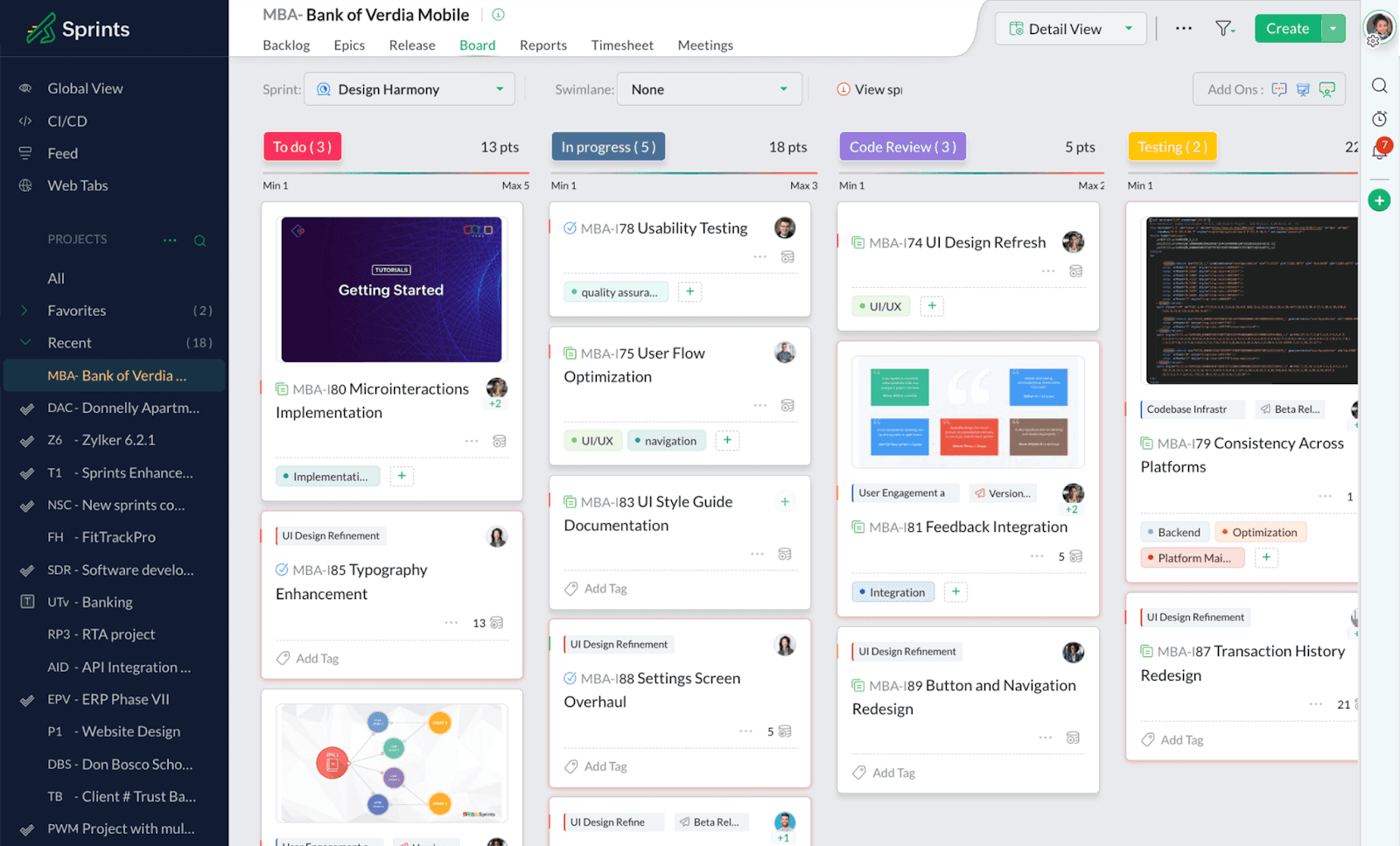
Zoho Sprints specifically targets agile teams with functionalities designed around sprint planning but remains cost-effective even beyond its day-free trial period especially beneficial if you're operating within tight margins yet require solid agile project management tools.
The platform allows development teams not just to track issues but also create workflows catered toward their specific needs—a boon when juggling multiple clients or projects concurrently.
In a G2 review, one user says:
We have been using Zoho Sprints for about 6 months, and have faced no major issues. It has all the tools that we need, we can creating and customizing project and sprint is easy, and the board is excellent. Creating, assigning, and managing ticket is very effective, all the users on my project has been able to learn it very easily. The user management features are also very good you can define user roles and is very customizable. And reports and dashboard gives me all the information is a visual and easy charts.
Tips on Transitioning from Jira to an Alternative Tool
Adopting a new project management platform can feel like steering a ship through uncharted waters. It's crucial for your team to maintain its course with minimal disruption. Here's some tips for how to make that transition as smooth as possible:
Understand Your Needs: Before making the switch, clearly understand why you are moving away from Jira. Identify the features you need, the limitations you’re facing with Jira, and how the new tool addresses these.
Evaluate and Choose Wisely: Research and evaluate different tools based on your requirements. Look for features that are a must-have for your team and consider the scalability, user interface, integration capabilities, and pricing of the new tool.
Plan the Transition: Create a detailed plan for the transition. This should include timelines, the process for transferring data, training schedules for team members, and a period for dual running both systems, if necessary.
Data Migration Strategy: Understand the data migration capabilities of the new tool. You may need tools or services to help transfer your data from Jira. Ensure that key data like project histories, user stories, tasks, and reports are migrated accurately.
Customization and Integration: If your team heavily used custom workflows, fields, or integrations in Jira, check how these can be replicated or adapted in the new tool. This might require additional configuration or finding new integrations.
Training and Support: Provide adequate training for your team. Switching tools often involves a learning curve, so ensure everyone is comfortable with the new system. Take advantage of training resources offered by the new tool’s provider.
Pilot Testing: Before rolling out completely, conduct a pilot test with a small, representative group of users. This can help identify potential issues and gather feedback for a smoother transition.
Communicate Openly: Keep communication channels open. Inform everyone involved about the reasons for the change, the benefits of the new tool, and how it will affect their work. Encourage feedback and be ready to address concerns.
Provide Adequate Support: In the early stages of the transition, ensure that there is sufficient support available for users. This could be in the form of an internal support team, external consultants, or resources from the new tool’s vendor.
Gather Feedback and Iterate: After the transition, actively seek feedback from the team on how they are finding the new tool. Be prepared to make adjustments to workflows, configurations, or training materials based on this feedback.
Monitor and Evaluate: Continuously monitor the adoption and impact of the new tool. Evaluate whether it meets the needs identified at the beginning and keep an eye on how it is affecting team productivity and morale.
Remember, switching tools can be challenging and may encounter resistance. It's essential to manage the change process thoughtfully, ensuring that the team understands the benefits and is adequately supported through the transition.
A Final Word
The best Jira alternatives bring variety to your project management game. Make sure you choose the right tool for your company's needs. The last thing you want to do is bring confusion or resistance to the team.
One extra tip? Try downloading the free Magical Chrome extension to see how you can automate tasks in Jira or any of these other platforms. Magical makes it easy to move info between tabs and write faster using AI. Give it a try today and see how the average Magical user saves 7 hours a week.
